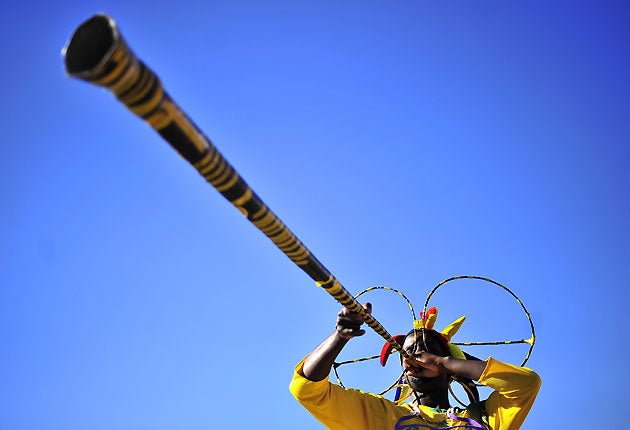Could the vuvuzela become the sound of British football?

Your support helps us to tell the story
From reproductive rights to climate change to Big Tech, The Independent is on the ground when the story is developing. Whether it's investigating the financials of Elon Musk's pro-Trump PAC or producing our latest documentary, 'The A Word', which shines a light on the American women fighting for reproductive rights, we know how important it is to parse out the facts from the messaging.
At such a critical moment in US history, we need reporters on the ground. Your donation allows us to keep sending journalists to speak to both sides of the story.
The Independent is trusted by Americans across the entire political spectrum. And unlike many other quality news outlets, we choose not to lock Americans out of our reporting and analysis with paywalls. We believe quality journalism should be available to everyone, paid for by those who can afford it.
Your support makes all the difference.If England fans thought that Robert Green's fumble would be the most traumatic thing to emanate from South Africa's World Cup, imagine this: British football stadiums buzzing to the furious drone of the vuvuzela.
It could become a reality. The long plastic horns, traditional instruments at South African football matches, have become an instant fixture in British pubs and parks, and yesterday the Premier League said that it would not impose a blanket ban on them despite complaints from spectators, television viewers and players about the noise.
The Premier League confirmed that there will be nothing to stop fans bringing them to matches in England and making them a feature of the British game.
"Nothing in our rules specifically prohibits musical instruments from being brought into grounds as such matters are dealt with at club level," said a spokesman. "It will be down to stadium managers, in consultation with supporter groups, to determine what is appropriate."
The supermarket giant Sainsbury's stocked up with 75,000 vuvuzelas in mid-May and has sold 37,000 of the horns so far at £2 each. One bookmaker has started taking bets on which Premier League club will be the first to stock them in club colours.
The vuvuzela has also become an instant success on the iPhone. An app which does nothing but replicate the sound of the buzzing horn has been downloaded 750,000 times.
The UK's largest club football stadium is Manchester United's Old Trafford, which holds 76,000 spectators. A spokesman said that because the horns were not banned by the Premier League – only air horns are – the club would adopt a "suck it and see approach".
He added: "The key thing will be about whether it is spoiling the experience of other people in the ground. Clearly in South Africa it is part of the uniform of a spectator whereas it is not necessarily part of the culture here.
"We do not plan to ban it immediately, but we will look at the first few games, which will be pre-season [friendly] games, and then monitor any complaints. We will deal with it like we would any other complaints – by listening to the fans. The key thing is that they enjoy the game, whether that be with or without vuvuzelas."
The BBC has received more than 200 complaints about the din of the vuvuzelas overwhelming its coverage, and internet message boards and websites such as Twitter have been flooded with grumbles about the noise.
The Spain striker David Villa said it makes team-mates harder to hear, and the Holland forward Robin van Persie claimed he could not hear the referee's whistle due to the noise. There was even a suggestion that they would be banned for the remaining World Cup games, but this has been flatly rejected by the Fifa president, Sepp Blatter. The horns are popular with the tournament crowds, especially those supporting the African nations.
There may be a saving grace for British football fans: one specialist suggested that vuvuzelas could soon be banned in football grounds in this country due to health and safety laws.
The Control of Noise at Work Regulations say that employers must provide extra training and ear protection if the regular noise in the workplace exceeds 85 decibels. A vuvuzela, blown from one metre away, is 116 decibels.
Trevor Cox, president of the Institute of Acoustics, said: "These regulations would mean that clubs would have to train and equip stewards to protect their ears against the noise. One of these things exceeds the noise at work regulations so imagine the effect thousands could have."
Join our commenting forum
Join thought-provoking conversations, follow other Independent readers and see their replies
Comments